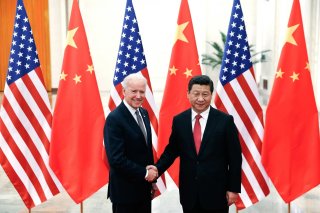Can China and America Resolve the Israeli-Palestinian Conflict?
By adopting a collaborative approach, the United States and China can leverage their influence with key regional players to de-escalate tensions and cultivate an environment conducive to a sustainable political resolution in Gaza.
The international tour of the Arab-Islamic Ministerial Committee, an initiative established by Islamic nations at the Arab-Islamic Summit in Saudi Arabia this month, marks a pivotal shift in the Middle East’s global diplomatic engagement and strategies with key external powers. This tour, which involves visits to permanent member states of the United Nations Security Council (UNSC), aims to press the UNSC to coalesce around encouraging a sustained humanitarian truce, a long-term ceasefire, and a political solution in Gaza. The committee’s diplomatic journey began with visits to China and then Russia, engaging in high-level talks with their respective foreign ministers. This was followed by another ministerial meeting in London with the newly appointed British foreign secretary, David Cameron, to rally the support of Israel’s major European allies.
The committee plans next to visit France, another UNSC member, but the real end goal of these consultations will be to bring the United States—the most influential decision-shaper in the Israeli-Palestinian conflict—closer to the committee’s own position of a speedy halt to the war.
This sequence of visits, beginning with Beijing and moving through other UNSC members, signals a broader shift in the Middle East’s regional geopolitics and diplomacy. It underscores an emerging multipolar order where Middle Eastern countries diversify their diplomatic engagements to address regional challenges.
The committee’s approach, particularly its initial focus on Beijing, reflects the region’s collective recognition of China’s growing role as a mediator in the Middle East, a status bolstered by its recent success in brokering the Iran-Saudi deal. In this evolving context, China is also capitalizing on its growing clout and positioning itself as an impartial mediator in the region, which some experts argue may be seen as a potential challenge to the United States’ traditional role and influence. Indeed, in contrast to China, regional elites today have somewhat less faith in Washington’s ability to play kingmaker and serve as a reliable security guarantor in the region, largely due to its unequivocal support for Israel in the current conflict.
However, this should not be viewed merely as a binary, zero-sum competition between the United States and China for influence in the Middle East. Rather, it represents an opportunity for collaborative diplomacy in a volatile region where both great powers wield significant influence over various parties that the other lacks while sharing strategic interests in maintaining security and peace.
The Iran-Saudi deal serves as a successful case study for China-U.S. diplomatic coordination, where both countries’ separate yet complementary influences played a crucial role over different actors in achieving a deal that benefitted not only the two powers but also the broader region and the international community. Even though there was no formal framework to harmonize U.S. and Chinese diplomatic strategy toward the deal, their coordination through third parties—namely Saudi Arabia, which enjoys cordial relations with both countries—helped reach a diplomatic breakthrough that several rounds of Iraqi-facilitated talks fell short of achieving.
Given their distinct roles—the United States with its longstanding regional presence and security relationships, and China with its economic influence in the region—both nations are uniquely positioned to work within a cooperative framework, inspired by their success story in the Iran-Saudi deal, to end the war in Gaza.
By adopting a collaborative approach, the United States and China can, in coordination but through separate channels, engage and leverage their influence with key regional players, including Israel, Turkey, Qatar, Saudi Arabia, and Iran, along with their respective proxies in the region. Such a concerted effort is essential to de-escalating tensions and cultivating an environment conducive to a sustainable political resolution in Gaza.
It’s crucial to underline that both the United States and China, facing pressing challenges at home and abroad, are inclined to avoid further conflict in the Middle East. For both countries, improving domestic economic conditions and addressing other foreign policy files such as the ongoing war in Ukraine, climate change, and managing their complex bilateral relations take precedence. The recent agreement between President Joe Biden and President Xi Jinping to re-establish military-to-military communication channels, as announced at the last Asia-Pacific Economic Cooperation summit, indicates that both countries prefer cooperation over escalation even in their bilateral relations, let alone in other regions.
In light of this positive development in their bilateral relations, a U.S.-China cooperative framework to end the war in Gaza in close collaboration with regional countries and other UNSC members could offer a “win-win” scenario for both Washington and Beijing and, by extension, for the region and the global community. Such cooperation will not only resolve the immediate conflict more likely but also contribute to a more peaceful Middle East. Perhaps just as significantly, it could help rebuild trust between these two major powers as they manage their strategic competition in an increasingly multipolar global landscape.
Younes Zangiabadi is the co-founder and executive vice-president of the Institute for Peace & Diplomacy.
Paul Dziatkowiec is the director of Mediation and Peace Support at the Geneva Centre for Security Policy.

